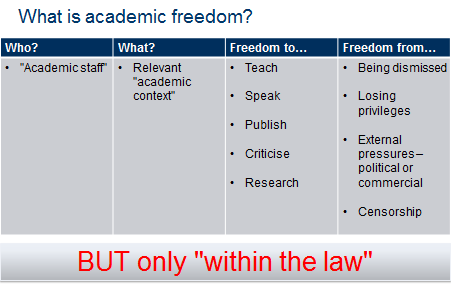Academic Freedom v Employment Rights - what you need to know to ensure best HR practice
Blog

Recent controversies have brought a renewed focus on the concept of academic freedom and the protections it offers for academics to enjoy wide discretion in what they say, how they conduct their work, what they publish, and who they can criticise.
Academic freedom is entrenched in the culture of UK universities, and a fundamental part of a free society – it allows academics to challenge and test controversial ideas and criticise both the state and the institutions they work at without fear of being dismissed.
However, the interplay of academic freedom with employment rights - especially when the two come into conflict – can present issues for HE HR professionals seeking to conduct investigations, manage poor performance and handle disciplinary issues. Academic freedom is often presented as a 'trump card', allowing academics carte blanche to behave with impunity and without any fear of dismissal or disciplinary action.
But the legal notion of academic freedom is actually more complicated than most people (including many academics) think, and perhaps much narrower.
First, the statutory definition of academic freedom, which is found within s202 of the Education Reform Act 1988, says that academics enjoy freedom "within the law to question and test received wisdom, and to put forward new ideas and controversial and unpopular opinions, without placing themselves in jeopardy of losing their jobs or privileges they may have at their institutions". The fact that academic freedom has to be exercised "within the law" shows that academic freedom is intended to be a limited right, to be balanced against other people's rights and freedoms and other legal obligations. This gives HR professionals some scope to take other interests into account when assessing the application of academic freedom in any particular case.
Second, the legal status of academic freedom under English law is unclear. It is important to note that the s202 definition set out above does not place a positive duty on universities to ensure academic freedom – the wording of the Education Reform Act does not say that academic freedom is something that universities have to ensure, guarantee or protect. Instead, academic freedom is one of the three factors which "University Commissioners" have to take into account when exercising their functions. University Commissioners are those people to review university statutes and improve the provisions dealing with academic tenure. A recent High Court decision confirmed that the duty to take academic freedom into account is a duty on University Commissioners and not on the university itself.
Finally, academic freedom can only be enjoyed by academics exercising their rights in a relevant academic context, ie whether what the academic says or has done has the relevant "academic element". This is set out in the European Court of Human Rights decision in Erdogan v Turkey, in which the Court held that academic speech (which should be afforded a high level of protection in a democracy) could be identified by asking: "a) whether the person making the speech can be considered an academic; b) whether that person's public comments of utterances fall within the sphere of his or her research; and c) whether that person's statements amount to conclusions or opinions based on his or her professional expertise and competence." The key point here is that academics have to have been wearing an 'academic hat' to engage academic freedom, suggesting that what they have said or done needs to relate to their sphere of academic expertise.

So, contrary to the way it is sometimes raised by academics, academic freedom is not an HR or employee relations "trump card". Academics cannot make comments relating to someone's gender, sexual orientation or religion; it is not a defence to harassment or treating another member of staff less favourably based on a protected characteristic – that would be outside the law. Nor does academic freedom mean an academic can publicly criticise anything which the university does – they are protected only when commenting within their own academic context.
The take away for HR professionals is that this concept is less complicated than you think and the balancing act required is well within your experience and expertise of balancing conflicting rights (and people!). Simply remember that academic freedom must be protected but not at the expense of other people's employment and equality rights, not when it is outside the law and not when that right is not relevant to the situation at hand.
If you require further information on anything covered in this briefing please contact Kathleen Heycock ([email protected]; 020 3375 7113) or Jeremy Isaacson ([email protected]; 020 3375 7513) or your usual contact at the firm on 020 3375 7000.
Further information can also be found on the Higher Education page on our website.
This publication is a general summary of the law. It should not replace legal advice tailored to your specific circumstances.
© Farrer & Co LLP, June 2016







